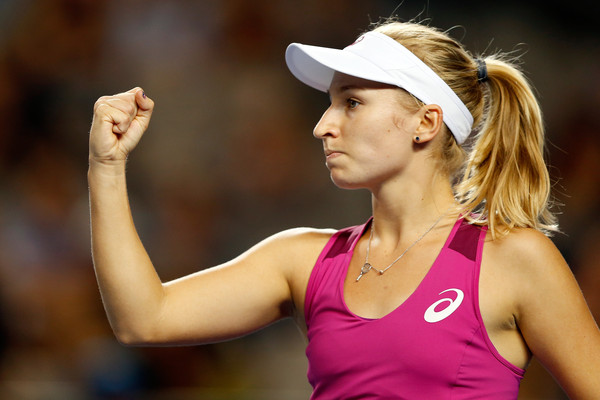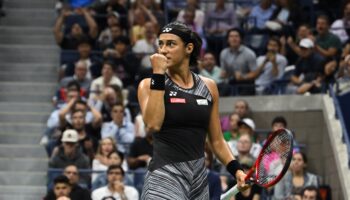
–by Emna Achour
MELBOURNE – The Grand Slam in the Land Down Under has been the land of all the upsets on the women’s side so far.
Just to list a few, Caroline Wozniacki, Venus Williams and world No. 2 Simona Halep were all gone before the end of Day 2 of the 2016 Australian Open, opening the door for newcomers and inexperienced players to make a long run in Melbourne – to the point where a large section of the main draw became unrecognizable by the weekend.
Of the group of women who sprung upsets in the Melbourne heat, some of them went all the way to reach the Round of 16 at a Grand Slam for the first time in their careers, including 21-year-old Germans Anna-Lena Friedsam and Annika Beck, 27-year-old Chinese Zhang Shuai, 21-year-old Russian Margarita Gasparyan and 21-year-old Australian and fan favorite, Daria Gavrilova.
In the second round, Gavrilova ousted Czech Petra Kvitova, the sixth seed and two-time Wimbledon champion, in straight sets, then followed that up with a win over 2015 U.S. Open quarterfinalist Kristina Mladenovic from France. The Russian-born Gavrilova, who became a permanent resident of Australia in 2013 and became a citizen just last year, called the win over Mladenovic “the best win of [her] whole career,” a match that required a thrid set which she won 11-9. She unfortunately wasn’t able to get past the 10th-seeded Spainiard Carla Suarez Navarro this morning, even after Gavrilova took the first set at love. However, she left her mark forever in the hearts of the Australian fans hoping for a champion in the up-and-coming generation of Australian tennis players.
Though she was very disappointed about not making it to the quarterfinals – blaming the fact that she let her emotions get the best of her – Gavrilova, who now owns seven wins against the Top 20 since last March (none in her career prior), will still keep great memories of this incredible run.
“I was beating a Top 10 player, I was winning six-love, I was up one-love in the second set. That gives me a lot of confidence,” she said after the match Sunday.
Just prior to the end of that match, Friedsam was even closer to continuing a career-changing Grand Slam run before it ended in the most heartbreaking of fashion. The German, who won a first-set tiebreak before dropping the second set convincingly to world No. 4 Agnieszka Radwanska, stormed out to a 5-2 lead in the final set, using a thunderous two-handed backhand to fluster the Pole all set long. Radwanska won the final five games of the set, but was aided chiefly by Friedsam suffering from severe leg cramps at the worst possible time. Friedsam was broken at 5-3, and, during that game, gently slapped her upper left leg a couple of times before her first serve. After a medical timeout, Friedsam made some headway on Aga’s service game, getting to within two points from victory at 4-5, 30-30. Two points later, however, Friedsam did even more damage to her leg when extending to return a serve up the middle, crumpling to the floor as Radwanska held for 5-5.

Friedsam, knowing that her condition would not allow her to realistically win the match, started to tear up as he began her service game. After being called for her first time violation, she started that service game with an underhand serve, a la Michael Chang at the 1989 French Open. The game ended with her being called for her second time violation at 15-40, giving Radwanska a 6-5 lead.
Konta can almost be called a veteran among this group, with the 24-year-old Brit having already reached the fourth round at another Grand Slam before (2015 US Open). But after her win against Denisa Allertova in the third round on Saturday, she assured everyone that her good performance in New York City last summer was not in the back of her mind at all at the moment, even if it’s considered as proof of her newfound consistency on the tour.
“Well, I mean, obviously I am pleased to be in the second week again,” she said after winning against Allertova. “But I don’t really look back and compare it to the US Open and compare it to anything really. I’m just happy I’m competing at the event I’m at, which happens to be the Australian Open, so it’s pretty cool.”
“Otherwise, yeah, I’m very much just in the here and now…I’m really not thinking any further than that.”
After three wins in Melbourne so far, Konta – who was actually born in Sydney but moved to England with her family at the age of 14 – says that, more than ever, she is satisfied with her ability to move on from any difficulty within her matches.
“I’m quite happy with how I have been able to just, you know, focus and refocus,” she said. “I think it’s because that is the main thing that I can somewhat control. But I’m definitely happy with how I’m competing out there.”
With a win against No. 21 Ekaterina Makarova today, Konta would become the first British woman to reach the quarterfinals of a major since Jo Durie made the last eight at Wimbledon in 1984.
Naomi Osaka, the Japanese 18-year-old who took out No. 18 Elina Svitolina in the second round, did end up losing to two-time Australian Open champion Victoria Azarenka in the thrid round Saturday, ending her best-ever performance ever in a major tournament. (This was Osaka’s first-ever appearance in a Grand Slam main draw.) She insisted, however, that she has learned more in one week in Melbourne than ever before in her young career.
“Honestly I’m a bit glad she beat me like this because I have so much more to learn and I can take this as a good experience,” said Osaka, the daughter of a Haitian father and Japanese mother who grew up in the United States. “I mean, I’m glad I lost but I would also be very happy if I won. I say that because if I were just to have beaten her, I don’t think I would learn as much. I think I can learn more from my mistakes than from winning.”
Fans of Venus, Kvitova, Halep and other top-seeded players who didn’t last more than a couple of sets are probably fretting about this wave of newcomers that washed over this year’s Australian Open. But in the end, these open draws are a big part of what makes tennis so great to watch.
[Cover photo (Johanna Konta) courtesy of Ryan Pierse/Getty Images AsiaPac]




